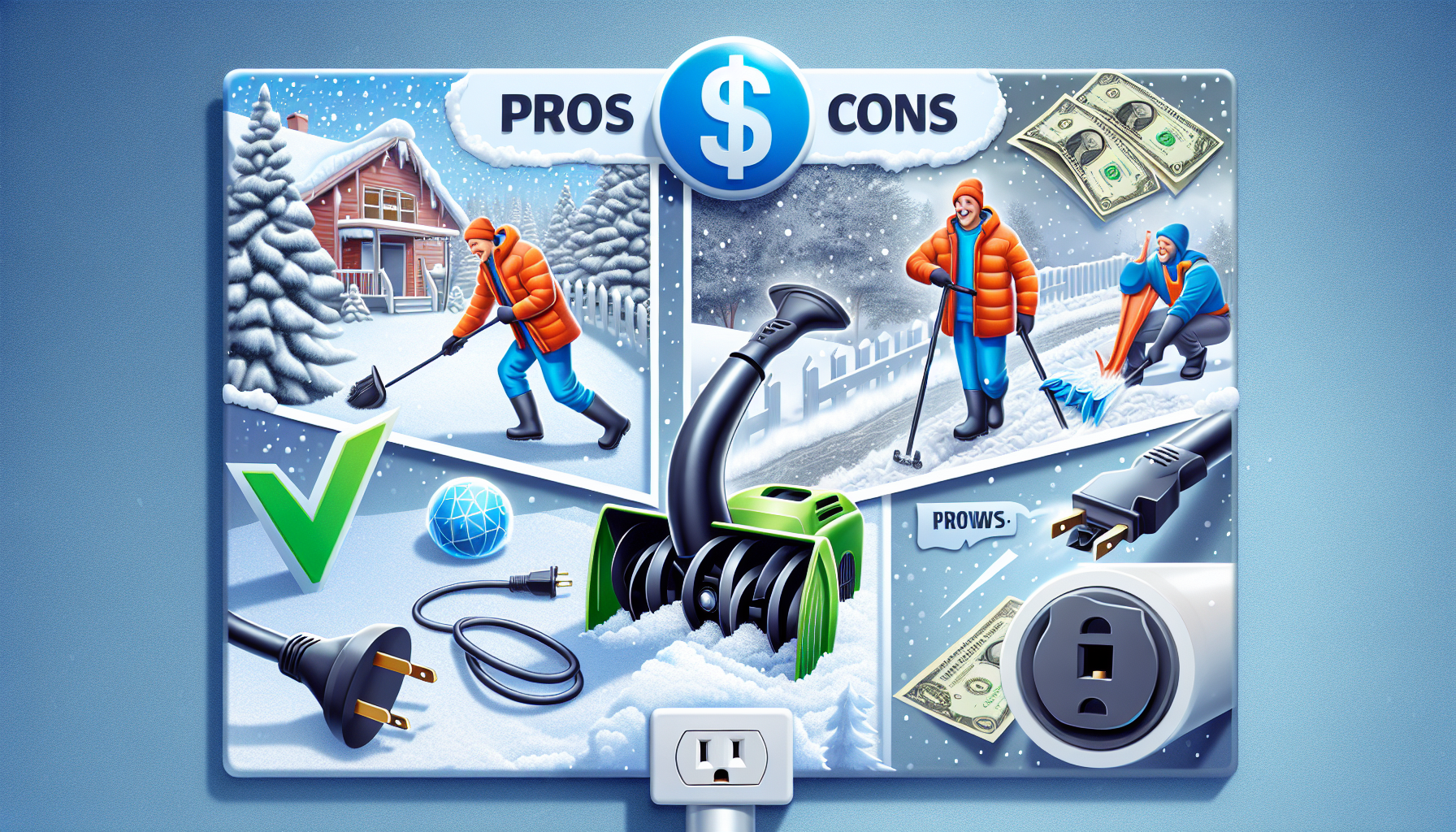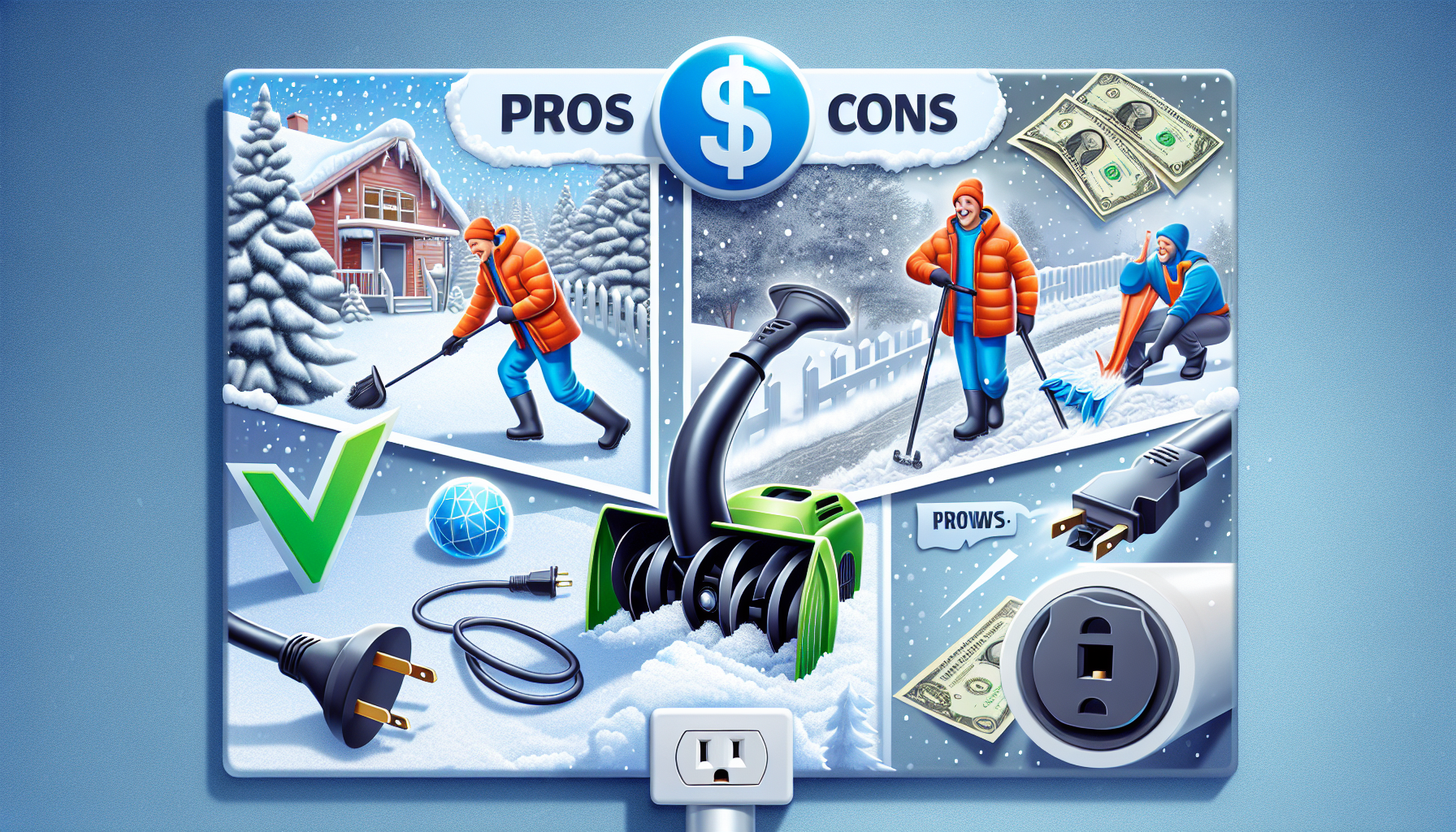Are you tired of shoveling snow the old-fashioned way? Perhaps you’re considering investing in a snow blower, specifically an electric one. But before you make a decision, it’s important to weigh the pros and cons. On one hand, electric snow blowers are eco-friendly and require less maintenance compared to their gas-powered counterparts. On the other hand, they may not pack as much power and are limited by their cord length. So, is an electric snow blower worth it? Let’s explore the advantages and disadvantages to help you decide.

Pros of an Electric Snow Blower
Environmentally Friendly
One of the biggest pros of an electric snow blower is its environmental friendliness. Unlike gas-powered snow blowers that emit harmful gases and contribute to air pollution, electric snow blowers run on electricity and produce zero emissions. This not only helps to keep the air clean and free from harmful pollutants but also reduces our carbon footprint. So, if you are conscious about protecting the environment and want to make a greener choice, an electric snow blower is the way to go.
Ease of Use
Another major advantage of electric snow blowers is their ease of use. Unlike traditional snow blowers that require manual cranking or pulling to start, electric snow blowers simply need to be plugged into an electrical outlet and switched on. They eliminate the hassle of dealing with gas refills, oil changes, and complicated starting mechanisms. With just a push of a button, you can effortlessly start clearing snow from your driveway or sidewalk. This convenience makes electric snow blowers a popular choice for individuals who prefer hassle-free equipment.
Low Maintenance
Compared to their gas-powered counterparts, electric snow blowers require significantly less maintenance. Gas-powered snow blowers need regular oil changes, spark plug replacements, and fuel stabilizer additives to keep them running smoothly. On the other hand, electric snow blowers have fewer moving parts and do not require oil or fuel. This means less time and money spent on maintenance tasks, giving you more time to enjoy the snow-free outdoors.
Lightweight
Electric snow blowers are typically lighter in weight compared to gas-powered ones. This makes them easier to maneuver and control, especially for individuals who may not have a lot of upper body strength. The lightweight design also allows for effortless steering around tight corners, narrow paths, and obstacles. Whether you are an elderly homeowner or someone who prefers equipment that is easy to handle, the lightweight nature of electric snow blowers makes them a great choice.
Quiet Operation
One of the most significant advantages of electric snow blowers is their quiet operation. Unlike gas-powered snow blowers that produce loud engine noises, electric snow blowers operate silently. This is particularly beneficial in residential areas where loud noises can disturb your neighbors. By using an electric snow blower, you can clear away snow without causing noise pollution or disturbing the peace and tranquility of your surroundings.
Cons of an Electric Snow Blower
Limited Power
One of the primary drawbacks of electric snow blowers is their limited power compared to gas-powered models. Electric snow blowers are generally less powerful and may struggle with heavy, wet snow or large amounts of accumulated snow. This can result in slower snow clearing and the need for multiple passes to effectively remove all the snow. If you frequently experience heavy snowfalls or have a larger driveway, a gas-powered snow blower may be a better option to ensure efficient snow removal.
Corded Design
Most electric snow blowers have a corded design that requires them to be connected to an electrical outlet while in use. While this provides a continuous power supply, it also limits the range and mobility of the snow blower. The cord can become tangled or limit your movement, making it necessary to carefully plan your clearing path and avoid running over the cord. Additionally, the corded design may not be suitable for snow removal in large areas or far distances from an electrical outlet.
Limited Range
Due to their corded design, electric snow blowers have a limited range of operation. You are restricted to the length of the power cord, which can be a significant limitation when clearing large driveways or areas away from the power source. This means you may need to use extension cords or change outlets multiple times to cover the desired area. If you have a property with a vast snow-covered surface, a cordless snow blower or a gas-powered one with a longer reach may be a more practical choice.
Dependent on Electricity
One major disadvantage of electric snow blowers is their dependency on electricity. If you experience a power outage during a snowstorm, you won’t be able to use your electric snow blower until the power is restored. This can be a significant inconvenience, especially in areas prone to frequent power outages. Gas-powered snow blowers, on the other hand, operate independently of electricity and can be used even during power outages. Considering the weather conditions and reliability of your power supply is crucial when deciding between an electric or gas-powered snow blower.
Higher Upfront Cost
Compared to gas-powered snow blowers, electric snow blowers generally have a higher upfront cost. Although they offer long-term savings in fuel and maintenance, the initial investment required to purchase an electric snow blower can be higher. However, it’s worth considering the overall cost of ownership, including maintenance and fuel expenses, to make an informed decision. If you prioritize the environmental benefits, ease of use, and lower maintenance costs, the higher upfront cost of an electric snow blower may be a worthwhile investment.
In conclusion, electric snow blowers offer several advantages such as their environmental friendliness, ease of use, low maintenance requirements, lightweight design, and quiet operation. However, they also have some drawbacks including limited power, corded design, limited range, dependency on electricity, and a higher upfront cost. Considering your specific needs, the size of the area to be cleared, and the weather conditions in your region will help you determine whether an electric snow blower is the right choice for you.


